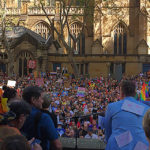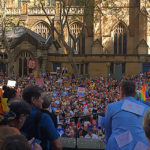The Religious Discrimination Bill: What’s It All About?

The widely publicised case of Israel Folau involved the Rugby superstar having his contract with Rugby Australia terminated for publishing material deemed to be offensive to LGBTI persons and others, in contravention of his employer’s repeated directions.
The self-described “devout Christian” subsequently filed a general protection complaint with the Fair Work Commission defending his conduct on the basis that his posts – which include statements that “drunks, homosexuals and adulterers” are destined for hell if they don’t repent – are a “religious message” taken from the Bible which were written on his personal social media page as a “loving gesture”, and were an improper ground for dismissal.
The Religious Discrimination Bill
Many believe the Folau saga informed the federal government’s recently-released exposure draft of the Religious Discrimination Bill 2019 – a document which contains a range of protections against the potentially adverse consequences of publishing religion-based material that is offensive to other groups, provided the conduct is “in good faith”.
The first page of the 58-page Bill describes it as, “A Bill for an Act relating to discrimination on the ground of religious belief or activity, and for related purposes”.
The aims
The stated objectives of the Bill are:
- to eliminate, so far as is possible, discrimination against persons on the ground of religious belief or activity in a range of areas of public life; and
- to ensure, as far as practicable, that everyone has the same rights to equality before the law, regardless of religious belief or activity; and
- to ensure that people can, consistently with Australia’s obligations with respect to freedom of religion and freedom of expression, and subject to specified limits, make statements of belief.
In which areas does the prohibition against discrimination apply?
The Bill prohibits discrimination against people of faith in an extremely broad range of areas, including:
- Employment,
- Employment agencies,
- The formation of business partnerships,
- Access to education,
- Access to accommodation,
- Access to estates and interests therein,
- Access to sports, including playing, umpiring, coaching and administration,
- Access to goods, services and facilities, whether public or private,
- Access to Commonwealth laws and programs,
- Access to any premises that the public, or a section thereof, is allowed to enter,
- Membership to registered organisations, and
- Membership to clubs.
Section 25 makes clear that it is unlawful to request or require information about a person’s religious views or activities if this is done to discriminate on that basis.
Employment discrimination explained
In the context of employment, section 13 of the Bill makes clear that:
(1) It is unlawful for an employer to discriminate against another person on the ground of the other person’s religious belief or activity:
(a) in the arrangements made for the purpose of determining who should be offered employment; or
(b) in determining who should be offered employment; or
(c) in the terms or conditions on which employment is offered.
(2) It is unlawful for an employer to discriminate against an employee on the ground of the employee’s religious belief or activity:
(a) in the terms or conditions of employment that the employer affords the employee; or
(b) by denying the employee access, or limiting the employee’s access, to opportunities for promotion, transfer or training, or to any other benefits associated with employment; or
(c) by dismissing the employee; or
(d) by subjecting the employee to any other detriment.
What are ‘services’?
Section 5 states that it is unlawful for providers of the following services to discriminate against persons of faith:
- all professions and trades;
- entertainment, recreation or refreshment;
- transport and travel;
- telecommunications;
- banking, insurance, superannuation and the provision of grants, loans, credit and finance;
- all government services; and
- all government authorities and local government bodies.
The section makes clear the list is not exhaustive.
What is the religious protection offered?
The Bill seeks to protect the religious beliefs and activities of persons of faith, including statements thereof.
In that regard, section 5 defines ‘religious belief or activity’ as:
- holding a religious belief;
- engaging in lawful religious activity;
- not holding a religious belief; or
- not engaging in, or refusing to engage in, lawful religious activity.
A ‘statement of belief’ is one which:
- Is of a religious belief held by a person, that is made in good faith, and is of a belief that may reasonably be regarded as being in accordance with the doctrines, tenets, beliefs or teachings of the religion; or
- Is made by a person who does not hold a religious belief, is about a belief held by the person that arises directly from the fact he or she does not hold a religious belief, and is made in good faith about religion.
What is discrimination?
The Bill provides a general definition of ‘discrimination’ which encompasses both direct and indirect discrimination.
In relation to direct discrimination, section 7 provides that:
A person discriminates against another person on the ground of the other person’s religious belief or activity if:
(a) the person treats, or proposes to treat, the other person less favourably than the person treats, or would treat, another person who does not have or engage in the religious belief or activity in circumstances that are not materially different; and
(b) the reason for the less favourable treatment is the person’s religious belief or activity.
As to indirect discrimination, section 8(1) states:
A person discriminates against another person on the ground of the other person’s religious belief or activity if:
(a) the person imposes, or proposes to impose, a condition, requirement or practice; and
(b) the condition, requirement or practice has, or is likely to have, the effect of disadvantaging persons who have or engage in the same religious belief or activity as the other person; and
(c) the condition, requirement or practice is not reasonable.
When is discrimination based on the ‘ground’ of religious belief?
Section 6 of the Bill provides that discrimination is on the ground of a person’s religious belief or activity if it is on grounds of:
- a characteristic that people who have or engage in the religious belief or activity generally have;
- a characteristic that people who have or engage in the religious belief or activity are generally 16 presumed to have;
- the religious belief or activity that a person has or engages in;
- the religious belief or activity that a person has had or engaged in in the past, whether or not the person still has or engages in the religious belief or activity;
- the religious belief or activity that a person is thought to have or engage in, whether or not the person has or engages in the religious belief or activity; or
- the religious belief or activity that a person is thought to have had or engaged in in the past, whether or not the person has had or engaged in the religious belief or activity in the past.
It is evidently an extremely broad definition.
When is discrimination against persons of faith permissible?
Section 11(1) of the Bill makes clear that conduct does not amount to unlawful discrimination if it is:
(a) reasonable in the circumstances;
(b) consistent with the purposes of this Act; and
(c) either:
- intended to meet a need arising out of a religious belief or activity of a person or group of persons; or
- intended to reduce a disadvantage experienced by a person or group of persons on the basis of the person’s or group’s religious beliefs or activities.
In addition, section 8(1)(c) provides that indirect discrimination is permissible where it is demonstrated that a condition, requirement or practice is reasonable.
In determining reasonableness, section 8(2) provides that ‘all the relevant circumstances of the case’ are to be considered, including:
- the nature and extent of the disadvantage resulting from the imposition, or proposed imposition, of the condition, requirement or practice;
- the feasibility of overcoming or mitigating the disadvantage;
- whether the disadvantage is proportionate to the result sought by the person who imposes, or proposes to impose, the condition, requirement or practice;
- if the condition, requirement or practice is an employer conduct rule—the extent to which the rule would limit the ability of an employee of the employer to have or engage in the employee’s religious belief or activity.
Big business
Special rules apply to non-government businesses with at least $50 million in revenue for the current or previous financial year.
As to those businesses, section 8(3) states that a condition, requirement or practice that would restrict or prevent an employee from making a statement of belief outside work is not reasonable unless the employer shows it to be “necessary to avoid unjustifiable financial hardship to the employer”.
However, section 8(4) provides that this ‘financial hardship’ requirement does not need to be shown where an employee makes a statement of belief that is:
- malicious, or
- likely to harass, vilify or incite hatred or violence against another person or group of persons.
In the context of Israel Folau, the Bill would enable large, non-government organisations such as Rugby Australia to argue that conditions prohibiting employees from publishing material that is offensive to certain groups – such as the LGBTI community – are indeed “necessary to avoid unjustifiable financial hardship to the employer”; as evidenced by the loss of sponsorship revenue resulting from Mr Folau’s conduct.
Rugby Australia could additionally argue that Mr Folau’s publications to the effect that homosexuals will go to hell if they fail to repent amount to a statement of belief that is “likely to harass, vilify or incite hatred or violence against another person or group of persons.”
Exceptions
The Bill contains a range of exceptions to, and rules relating to exemptions from, the protections against religious discrimination.
These include:
Religious bodies
Section 10 provides that a ‘religious body’ does not discriminate if it engages, in good faith, in conduct that may reasonably be regarded as being in accordance with its doctrines, tenets, beliefs or teachings.
‘Religious body’ is defined broadly as a registered charity or any other body (other than one that engages solely or primarily in commercial activities) or an educational institution that is conducted in accordance with the doctrines, tenets, beliefs or teachings of a particular religion.
Counselling or promoting a serious offence
Section 27 provides an exception where a person of faith has expressed a religious belief which a reasonable person, having regard to all of the circumstances, would conclude that the statement amounts to counselling, promoting, encouraging or urging conduct that would constitute a ‘serious offence’.
A serious offence is one involving harm or financial detriment that attracts a maximum penalty of two years or more.
Registered charities
Section 28 states that registered charities can have a discriminatory provision in their governing rules if it confers benefits for charitable purposes or enables charitable purposes to be conferred.
Complying with other legislation
Section 29 makes clear that it is not unlawful to discriminate if this is necessary to comply with a commonwealth law, or a law of the state or territory in which the conduct occurs.
Complying with an order
Similarly, section 30 provides that discrimination on the basis of a religious belief or activity is permissible where it is necessary to comply with an order of a court or tribunal, or an instrument under the Fair Work Act.
Exceptions relating to specific areas
Employment, partnerships and agencies
Section 31 provides that an employer, business partner or employment agency can discriminate where to do otherwise would cause the employer, partner or agency to be unable to carry out its inherent requirements.
Accommodation
Section 32 states that an accommodation provide may discriminate where he or she, or his or her relative, resides and intends to continue to reside, and there are no more than three persons at the premises.
Disposal of land
Section 33 provides that protections do not apply in respect of the disposal of an estate or interest in land if this is done by way of a gift or in a will.
Clubs
Section 34 allows a club which restricts membership to adherents of a particular religion to discriminate against non-adherents.
Voluntary bodies
Similarly, section 35 permits voluntary bodies whose membership is restricted to adherents of a particular religion to discriminate against non-adherents.
Exemptions
Sections 36 empowers the proposed Freedom of Religion Commissioner to grant exemptions on a case-by-case basis, and applications for exemptions can be made under section 37.
Section 39 gives the Commissioner the power to revoke or vary exemptions, and appeals against exemption decisions can be made to the Administrative Appeals Tribunal pursuant to section 40.
Onus of proof
Section 8(7) of the Bill makes clear that the onus of proving that a condition, requirement or practice does not discriminate due to religious belief or activity rests on the person or organisation that is asserting it.
Statements of belief are patently not discriminatory
Section 41 re-asserts that a person’s statement of religious belief does not discriminate against another unless it is malicious or likely to harass, vilify or incite violence or hatred against another.
The section has the potential to undermine existing anti-discrimination legislation, both federal and state and territory, as is means that statements which might be considered discriminatory against vulnerable groups may be permissible. This is significant given that federal legislation overrides state and territory legislation to the extent of any inconsistency.
Offences
The Bill proposes two discrete criminal offences, which are set out in sections 43 and 44.
Section 43 provides that a person who victimises another based on the other’s religious belief or activity if guilty of a crime punishable by up to 30 penalty units and 6 months in prison.
Victimisation includes where a person intentionally causes an actual detriment to another as a result of the fact the other person has made a complaint, or proposed to make a complaint, under the provisions of the Bill.
It also includes where a person makes an express or implied threat intending, or being reckless to the fact that, another person will fear a detriment based on a matter arising from the Bill.
Section 43 prescribes a maximum penalty of 10 penalty units for those who publish or display an advertisement or notice which indicates, or which could reasonably indicate, an intention to engage in conduct that is unlawful under the Bill.






